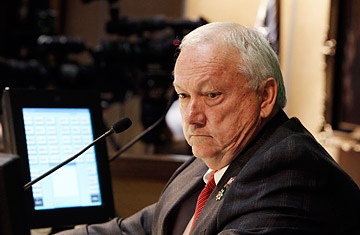
Senate President Russell Pearce, watches the votes tally to adjourn during a special session in the senate chambers at the capitol, Monday, June 13, 2011, in Phoenix, Arizona.
Arizona Senate President Russell Pearce, the conservative politician and former cop who famously sponsored Arizona's anti-illegal immigration bill SB1070, is in yet another showdown. This time, though, the fight isn't about birthright citizenship or Obama's birth certificate: it's about whether voters in Pearce's west Mesa district will let him serve out the remainder of his two-year term.
On Tuesday, Governor Jan Brewer, a Pearce ally, scheduled a recall election for Nov. 8 after an anti-Pearce group calling itself Citizens for a Better Arizona submitted more than 10,000 valid signatures in favor of special election (nearly 3,000 more signatures than required by law). Pearce has said he may challenge the validity of the signatures, which he told Reuters were gathered by "outside forces that support lax law enforcement, amnesty and open borders." And if there is an election, it's unclear who will stand against him or whether the challenge will be a serious one. But either way, the recall — the first ever against a sitting Senate President in Arizona — may be an early bellwether for the GOP leading into the 2012 elections. Which will resonate more with Pearce's conservative district: grandstanding or governance?
Throughout his legislative career — he was first elected to the Arizona House in 2000 before moving on to the Senate — Pearce has been nothing if not consistent. His son, also a police officer, was shot and wounded by an illegal immigrant in 2004, but even before then, Pearce spoke about securing Arizona's borders with a raw and personal passion. His blunt advocacy (and his willingness to vilify opponents as, to take a mild example, the "anti-rule-of-law folks") at first made him an outlier in Arizona politics. In time, however, the rhetoric, particularly around border issues, moved in his direction. He went from fringe to a voice for a mainstream fear of what illegal immigration was doing to Arizona. Not long after SB1070 passed, with just one Republican voting against it, Pearce was elected President of the Senate.
But that same ardor that made his career could be his undoing. He's come under heavy criticism for focusing on wedge issues in the midst of a downturn that is hitting Arizona harder than many states. In 2009, he fought for a bill that would have forced President Obama, whom he once said was launching a "jihad" against Arizona, to prove his citizenship. And although Arizona is still grappling with a shutdown of state parks and broad cuts to health care and education, Pearce continues to categorize as a legislative priority the state bill calling for the repeal of the federal 14th Amendment, which gives citizenship to anyone born in this country.
He has survived controversies before. He was photographed with a supporter who turned out to be a far-right sympathizer who had spoken at neo-Nazi rallies. He sent an email to his supporters with an attachment from a white supremacist group. But that was when he was a rebel voice in the legislature, not its leader.
And it's also possible that a state still reeling from the shooting of Rep. Gabrielle Giffords has tired of heavily dogmatic politics. It's not just Pearce: it's the enmity he inspires. Phoenix mayor Phil Gordon, for example, once called him part of Arizona's "axis of evil."
Regardless of the outcome on Nov. 8, though, Pearce has in many ways already won. The passage of his SB1070 last April inspired a string of states to pass similar, or in some cases, more aggressive bills in the same vein. And although key provisions of SB1070 were blocked by a federal judge, the state of Arizona has vowed to continue fighting, in true Pearce style, all the way to the Supreme Court.
